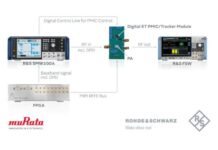TOKYO – Fujitsu Limited and NEC Corporation have begun developing technologies for interoperability testing(1) between 5G base station equipment conforming to O-RAN specifications at Fujitsu’s U.S. laboratories and NEC’s U.K. laboratories. This initiative will be implemented as part of the ‘Post 5G Infrastructure Enhancement R&D Project’ under the New Energy and Industrial Technology Development Organization (NEDO) of Japan. Both companies are scheduled to build a verification environment using these technologies in their respective laboratories from August of this year, then will begin interoperability testing. Leveraging this verification environment offers the potential to significantly streamline interoperability verification between base station equipment from different vendors.
Through this initiative, Fujitsu, NEC, and NEDO will accelerate the global reach of base station equipment that conforms to O-RAN specifications, and contribute to stimulating growth and innovation in the open 5G market.
1. Summary
With the start of 5G commercial services in various countries, post 5G(2) with enhanced functions such as ultra-low latency and multiple simultaneous connections is expected to be used in a variety of industries, such as automobile factories. It is expected that the technologies that realize these functions will serve as the core of Japan’s competitiveness.
In recent years, base station equipment has become more open due to O-RAN fronthaul interface specifications(3) formulated by the O-RAN Alliance(4), and it is becoming possible to connect to RUs (radio units) and CUs / DUs (central units / distributed units) from a variety of vendors. However, in order to quickly verify interoperability between different vendors’ equipment, it is necessary to establish a verification process, develop tools that can be used in common, and to develop a verification environment.
Under these circumstances, NEDO commissioned Fujitsu and NEC to conduct R&D on assessment and verification technologies for interoperability between base station equipment in the “Post 5G Infrastructure Enhancement R&D Project,” which is scheduled to run from FY2020 to FY2023. In response, Fujitsu and NEC are building an environment and developing technologies to assess and verify the interoperability of different vendors’ equipment and the impact of such connections on the entire network.
Fujitsu and NEC have begun developing technologies to verify base station equipment interoperability at their respective facilities in the U.S. and the U.K.. Fujitsu is conducting trials at its Open RAN laboratory hosted at Fujitsu Network Communications, Inc., a Fujitsu group company in the United States, while NEC is doing so at its laboratory in NEC Europe Ltd., London, U.K..
2. Characteristics of technology for interoperability verification and establishment of a verification environment
1) Significantly improve the efficiency of interoperability verification
Fujitsu and NEC will combine their many years of experience and know-how in developing base station equipment compliant with O-RAN fronthaul interface specifications. The two companies will develop technologies to verify the interoperability of various vendors’ equipment for O-RAN fronthaul. The technologies include FHA(5), P-DU(6), test scenario extraction tools(7), test parameter change tools(8), and validation result determination tools(9). Introducing these technologies into the verification environments of both companies’ laboratories, will make it possible to significantly improve the efficiency of interoperability verification for different vendors’ equipment.
2) Verification under conditions close to commercial environments
In this project, Fujitsu’s lab in the U.S. and NEC’s lab in the U.K. will make it possible to implement a Conformance Test System that can perform standard tests in accordance with O-RAN specifications and to implement an End-to-End (E2E) Test System that can verify the connection from the core network to the terminal. In addition, by incorporating the newly developed technologies into the interoperability test systems, it will be possible to efficiently conduct system-wide normality verification and performance verification under conditions that are close to the commercial environments of each country and business.
3. Future plans
Fujitsu and NEC will establish a verification environment using new technologies in their respective laboratories from August of this year, and will begin interoperability testing. The two companies will collaborate with carriers, equipment vendors, and governments in various countries and regions, aiming to significantly reduce the time required to conduct interoperability testing for base station equipment. The companies will also work with NEDO to support the global adoption and development of equipment that conforms to O-RAN specifications through this project, thereby contributing to the stimulation and growth of the open 5G market.
(1) Interoperability Testing: Evaluates and verifies the connectivity between base station equipment, whether maximum throughput can be achieved, and whether required throughput can be achieved even when multiple user devices are connected.
(2) Post 5G: 5G with enhanced functions such as ultra-low latency and multiple simultaneous connections.
(3) O-RAN Fronthaul interface: An open interface that connects CU/DU and RU formulated by O-RAN Alliance.
(4) O-RAN Alliance (Open Radio Access Network Alliance): An industry-wide organization that promotes standardization with the aim of realizing an open and scalable next-generation wireless access network, incl 5G.
(5) FHA (FrontHaul Analyzer): The technology for verifying the normality of fronthaul protocols (M-Plane, CUS-Plane) in accordance with O-RAN specifications.
(6) P-DU (Pseudo-DU): The technology verifying the normality of the RU itself.
(7) Test scenario extraction tool: A tool that automatically extracts the best test scenario for each 5G network.
(8) Test parameter change tool: A tool that automatically extracts and changes test parameters for more efficient verification.
(9) Verification result determination tool: A tool that automatically checks pass or fail status of verification results.




















